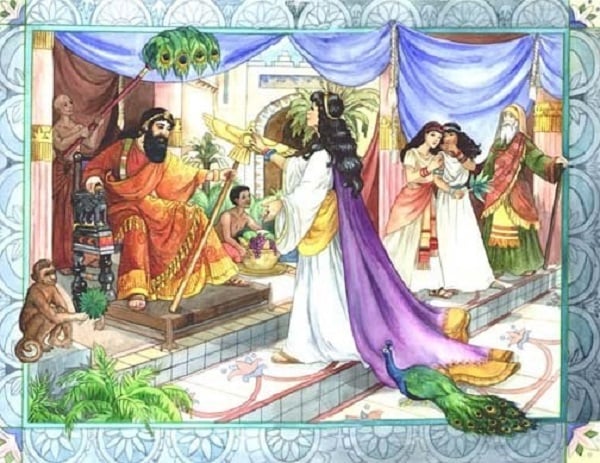
“Those who don’t know history are destined to repeat it” – Edmund Burke
It is so important for us to study history and learn the lessons that emerge from it. One of my seminary professors once said,
“There are no new heresies, just old ones dressed up in space suits.”
His goal was that we would learn where and how people deviated in their beliefs from the Word of God throughout history, and what the core of that deviation was, so that we can spot similar deception in the future.
Biblical history is similar, but it carries that added value of helping us to know how God’s rescue plan moved forward from the Garden of Eden to the end of time (seen in the book of Revelation). We believe the Bible is one unified story that leads to Jesus, and knowing the Old Testament history helps us to see this even more clearly.
So, let’s recap what we learned last Sunday about the historical books of the Old Testament.
These are the books we covered in the past two weeks.

There are six main sections of historical material in this part of the Bible.

This past Sunday we covered the last of the three kings of the unified kingdom of Israel, named Solomon, and the following history is told in the books of 1 and 2 Kings and 2 Chronicles.
- Solomon starts off well, building a permanent temple for the worship of God.
- He asks God for wisdom and God grants him wisdom and riches and a time of peace.
- Solomon intermarries with foreign women (700 of them), and these wives lead him to a place of compromising the covenant God made with His people by worshiping false gods.
- God decides that because of this violation of the covenant, He will split the kingdom, but preserve the line of David in Jerusalem through which the messiah (Jesus) will someday come.
 After Solomon dies, his son Rehoboam becomes king in his place in Jerusalem, and he worships false gods like his father did. This kingdom was called “The Kingdom of Judah”. (Jerusalem is in the territory of the tribes of Judah & Benjamin.)
After Solomon dies, his son Rehoboam becomes king in his place in Jerusalem, and he worships false gods like his father did. This kingdom was called “The Kingdom of Judah”. (Jerusalem is in the territory of the tribes of Judah & Benjamin.)
 The ten tribes in the north break away from the united kingdom and anoint a man named Jeroboam as their king. The northern kingdom retains the name “Israel” for their own.
The ten tribes in the north break away from the united kingdom and anoint a man named Jeroboam as their king. The northern kingdom retains the name “Israel” for their own.
Jeroboam forbids his people to travel south to Jerusalem to worship at the temple, and he sets up two false gods (golden calves) in the cities of Dan and Bethel for them to worship.
 He is known as “the king that led Israel to sin.” He is the evil king to which all other bad kings were compared. He also worships false gods.
He is known as “the king that led Israel to sin.” He is the evil king to which all other bad kings were compared. He also worships false gods.

The northern Kingdom of Israel had no kings who worshiped the true living God throughout 19 generations. The southern Kingdom of Judah did a bit better; 8 out of 20 of their kings worshiped God and lived in obedience.
By 722, God had waited long enough for the people to turn from their idolatry, and he sends the Assyrian empire to gobble up Israel – invading, destroying and scattering God’s people. Then the Babylonian empire swallows up Assyria… it’s like the bigger fish keeps eating the smaller fish.

Less than 150 years later, God sends the Babylonian empire to come and gobble up the Kingdom of Judah as well. They invade and destroy the temple that Solomon had built and carry away many of the people from the Kingdom of Judah to live in exile in Babylon.
God’s people are in exile for 70 years, just as the prophet Jeremiah had prophesied beforehand…
“This whole country will become a desolate wasteland, and these nations will serve the king of Babylon seventy years.” (Jeremiah 25:11)
During that 70 year period, an even bigger fish, the Persian empire, comes and takes over Babylon. So now the people of God, from the Kingdom of Judah are serving the Persian king. The Jewish people in the service of the King are so highly favored that the king sends some of them back to Jerusalem to rebuild the walls of the city and their lost temple. The king even sends them with supplies and resources. So, Persia spits out the Kingdom of Judah in their midst and sends them back to their land with blessing to rebuild.

The final three books of this section:

The people rebuild the temple in 516 BC, and Ezra and Nehemiah are key people in this rebuilding process in the books of the Bible that bear their name. Esther is a queen in Persia with Jewish ancestry and is used by God to save her people from genocide. The book about Esther shows how God is working behind the scenes to save, deliver and move his rescue plan forward at all times.
While this can be very confusing to remember, the important lessons we learn through the narrative sections of history of the Bible is that all scripture is inspired by God and profitable for us.
This completes the history of the Old Testament, and the three sections of genre that are left in the Old Testament (Poetry, Major Prophets, and Minor Prophets), all fit within the timeline that these books provide.
- The poetry books were written spanning the time of Moses (1400BC) all the way through the time of the exile (500BC).
- The “Major prophets” (Isaiah, Jeremiah, Ezekiel, Daniel) lived and led from 750BC to 500BC.
- The “Minor prophets” (12 of them) date from 950BC to 400BC.
These three groupings are what we will cover on the next three Sundays. That will complete the whole of the Old Testament, and by the time we get to 400BC, and a time of silence before Jesus, we will really be ready to hear about the Messiah and Savior, Jesus Christ!
Thanks for taking this journey with us. For more resources, charts and helps visit our website www.ncchico.org and click on the “Digging Deeper” tab and select which resource page you want to know more about.
I look forward to seeing you next Sunday at our Worship Service in the Dome at 10:00 a.m.
You can also live stream our service on Facebook and YouTube at 10:00 a.m.
If you missed last Sunday's message, The Big Picture #6 - The History Books Part 2, click here.



